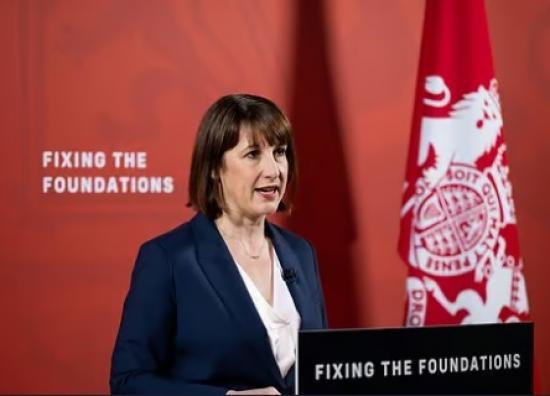Fixing The Foundations - How The UKs Chancellor Should Prioritise Clean Investment In Response To A Tight Fiscal Situation
6th August 2024

Rachel Reeves has announced significant spending cuts in her first major speech as Chancellor. Daisy Jameson and Esin Serin set out what this means for the UK's clean transition and the necessary considerations for driving much-needed progress in this challenging fiscal environment.
On 29 July 2024, the Chancellor announced the cancellation of several spending commitments made by the previous Government, in response to a review by the Treasury indicating a £22 billion blackhole in the UK's public finances. She stated that the fiscal position Labour has discovered since coming into government is more challenging than previously expected. Many found the cuts unsurprising, with the Institute for Fiscal Studies' director saying: "the extent of the in-year funding pressures does genuinely appear to be greater than could be discerned from the outside, which only adds to the scale of the problem". The Office for Budget Responsibility has referred to the Treasury's findings as "one of the largest year-ahead overspends against DEL [Departmental Expenditure Limits] forecasts outside of the pandemic years".
While the spending cuts do not touch the core of the Government’s commitments towards a cleaner economy, they do reflect an ongoing pattern of successive chancellors abandoning critical investment when the UK’s fiscal position becomes challenging, despite the long-term benefits of these investments.
It is precisely because of the pressures on the public finances that the UK needs bold leadership from Labour.
The UK needs to invest more for a clean, resilient and competitive future
Economic policy is inseparable from environmental policy (we discuss why at length in this earlier blog). Labour acknowledges this, having launched GB Energy (with £8.3 billion funding over five years) and the National Wealth Fund (with £7.3 billion of funding) within its first month in government. Both of these institutions will help the UK to deliver its clean energy transition as quickly as possible and provide economic benefits along the way. The Government has also injected an additional £500 million into its upcoming renewable energy auction, making this a record budget of any year.
However, this scale of investment remains far short of the required increase in annual public investment, identified by LSE earlier this year to amount to at least 1% of GDP (or £26 billion at current prices). It also follows Labour’s earlier watering down of its £28 billion investment programme ahead of the election, which it had previously described as being intended to drive ‘green prosperity’ in the UK.
Public investment could crowd in at least twice as much in private investment. This would help make up for decades of underinvestment in the country’s physical, natural, human, knowledge and social capital, to deliver on the need to tackle climate change, biodiversity loss and environmental degradation, and to be economically productive and competitive in the future.
The Chancellor has also cancelled some specific programmes that could have had a positive impact on net zero investment, such as the Investment Opportunity Fund, which may have seen investment in projects in green industries (among others). Furthermore, the review of the transport infrastructure portfolio and cancellation of the Restoring Your Railways programme could reduce investment in the public transport infrastructure required to rebalance demand between private and public transport and reduce overall energy demand.
Read the full article at London School of Economics with links to more information
